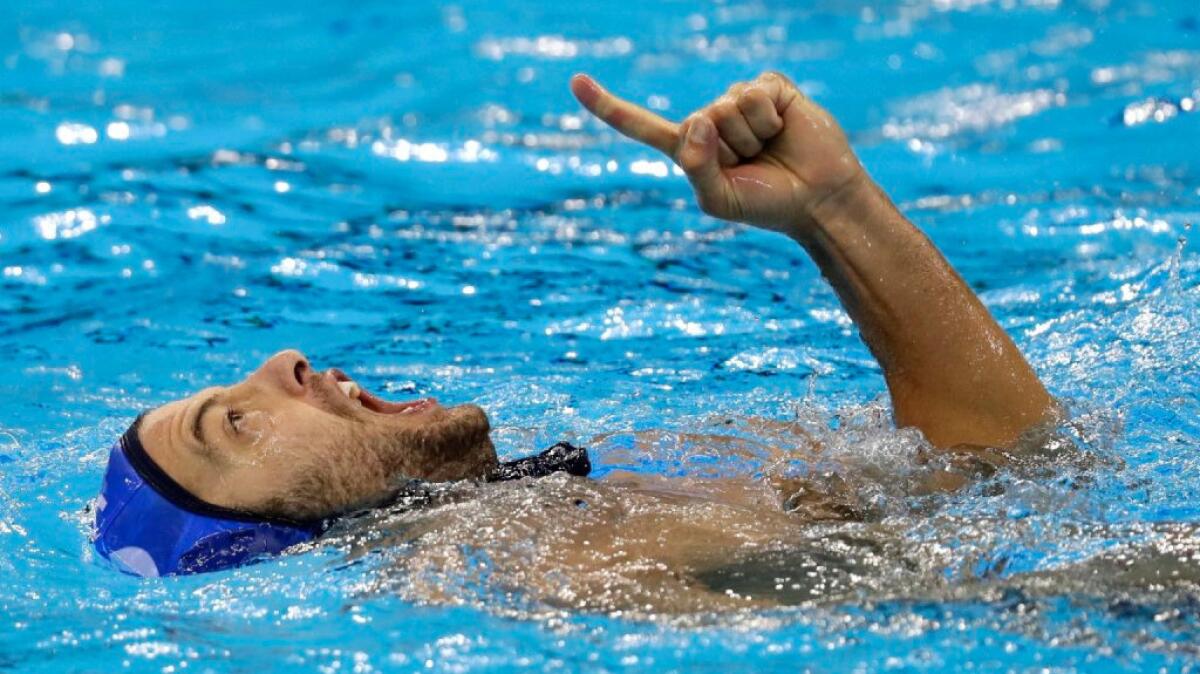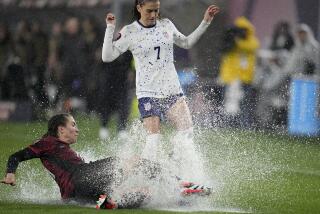Serbia beats Croatia for the water polo gold but it was more than a game

The men decorated with scratches and red marks trickled through a hallway at the Olympic Aquatics Stadium and insisted the past didn’t matter.
Their countries, Croatia and Serbia, share a 150-mile border and a bloody history. They battled in the early 1990s as part of the conflagration ignited by the breakup of the former Yugoslavia. They traded claims of genocide. Their sporting events against each other became about much more than who won or lost and regularly led to unseemly chants, riots, even diplomatic incidents.
On Saturday, they shared a pool in the water polo final at the Rio Games.
“We don’t have any enemies when we play against them,” Serbia’s Gojko Pijetlovic said after his country muscled its way to an 11-7 victory for the gold medal. “We don’t hate anybody. We just play water polo. We play everyone the same.”
Then he added: “It’s our national spirit. We don’t like to lose.”
The spirit echoed through the stadium even though empty seats outnumbered the occupied ones and Brazilians dressed in yellow and green dominated the crowd. A few hundred Serbian supporters in the upper bowl waved their country’s red, blue and white flag while a handful of hyperactive ringleaders urged on sing-song chants of “Serbia!”
This didn’t resemble some of the troubled previous meetings between the neighbors that date back to soccer brawls before Yugoslavia’s demise. Violence erupted between Croatian and Serbian supporters during the European water polo championship in 2003 — and led to a window-smashing attack on the Croatian embassy in Belgrade. Fans of the countries clashed in 2007 at the Australian Open tennis tournament, then collided later that year during a water polo match in Melbourne. Riot police became a familiar presence at games.
The usual handful of men wearing the maroon beret of Brazil’s National Public Security Force wandered through the stadium’s concourse Saturday with pistols strapped to their right legs. A bored-looking soldier stared blankly at the wall near dozens of parked baby strollers. There wasn’t anything for them to do.
Fans grabbed yellow commemorative cups of Skol beer to wash down hot dogs, tried on souvenir T-shirts and generally carried on as if this wasn’t one of the most heated, complex and violent rivalries in all of sports.
In the pool, however, everything looked different.
For 32 minutes, the Croatian and Serbian players wrestled, pushed, grabbed, tugged, shoved and punched each other. That’s just what you could see above water — what goes on below the surface is often worse in a sport that’s not known for its genteel nature.
Players ripped off the headgear of opponents and spent a good portion of the showdown appearing as if they were trying to drown each other.
“I will not be modest,” Pijetlovic said. “Now there is nobody stronger than us.”
This looked like one team physically dominating another, even if the Olympic charter hopes to use sport to “promote a peaceful society concerned with the preservation of human dignity.”
During one representative sequence in the third quarter, Croatia’s Damir Buric wrapped his arm around the neck of Serbia’s Slobodan Nikic a few feet from the goal. The players thrashed and wrestled and disappeared under water so frequently during the exchange that they became difficult to see other than splashing water and flailing limbs.
“It was very hard,” Croatia Coach Ivica Tucak said of the rough play, “especially because of the judges.”
Serbia has owned water polo in recent years, beating Croatia for the world championship in 2015 and winning everything else, it seemed, other than Olympic gold. The 13 players on the Serbian roster felt pressure, lots of it, to emerge from the Games with the right color of medal.
Earlier this month, Serbia Coach Dejan Savic said people back home were “waiting to cut the head off from our team if we don’t win the gold.”
As the final seconds disappeared, Serbian players screamed in celebration. One of them shook the hand of Croatia’s Andelo Sukno in the pool, then gave him a final — albeit playful — shove.
Someone tossed a Serbian flag into the water; the players hung it from the goal to the night’s loudest cheer.
“It feels like the whole team has reached eternity,” Serbia’s Dusan Mandic said.
Not long after, a silver medal hung around the neck of Croatia’s Josip Pavic.
“I think this is a great success,” he said.
The words were dull and lifeless. His head hung low. This still seemed like more than a game.
Follow Nathan Fenno on Twitter @nathanfenno
More to Read
Go beyond the scoreboard
Get the latest on L.A.'s teams in the daily Sports Report newsletter.
You may occasionally receive promotional content from the Los Angeles Times.







